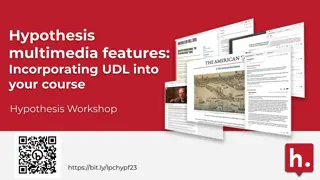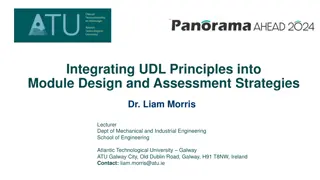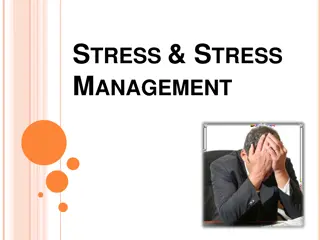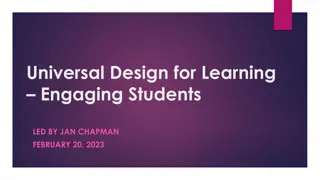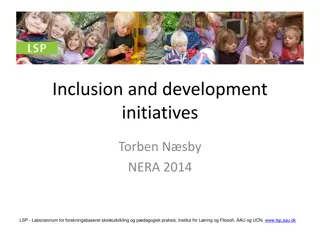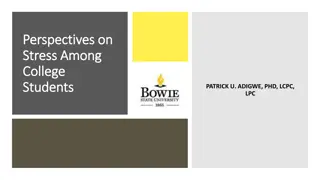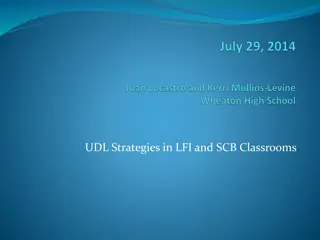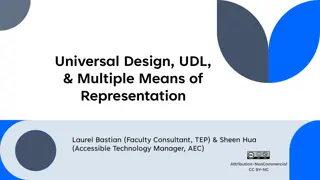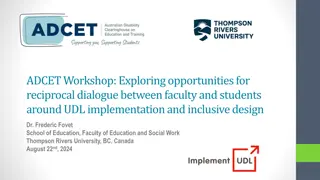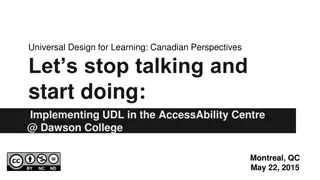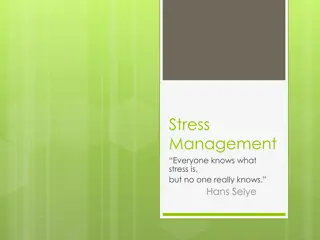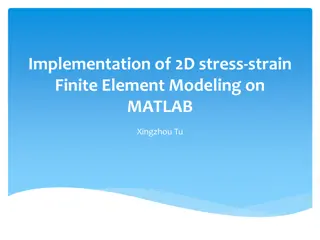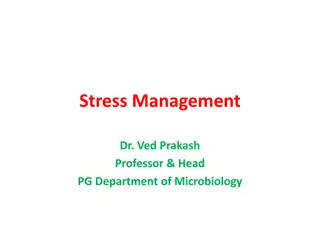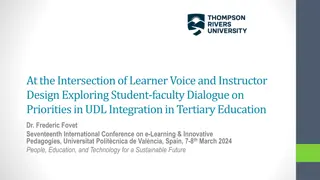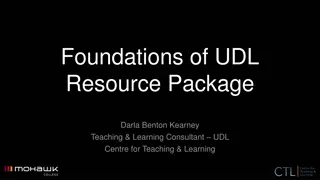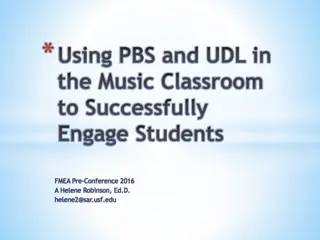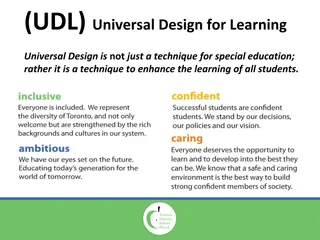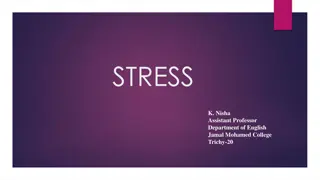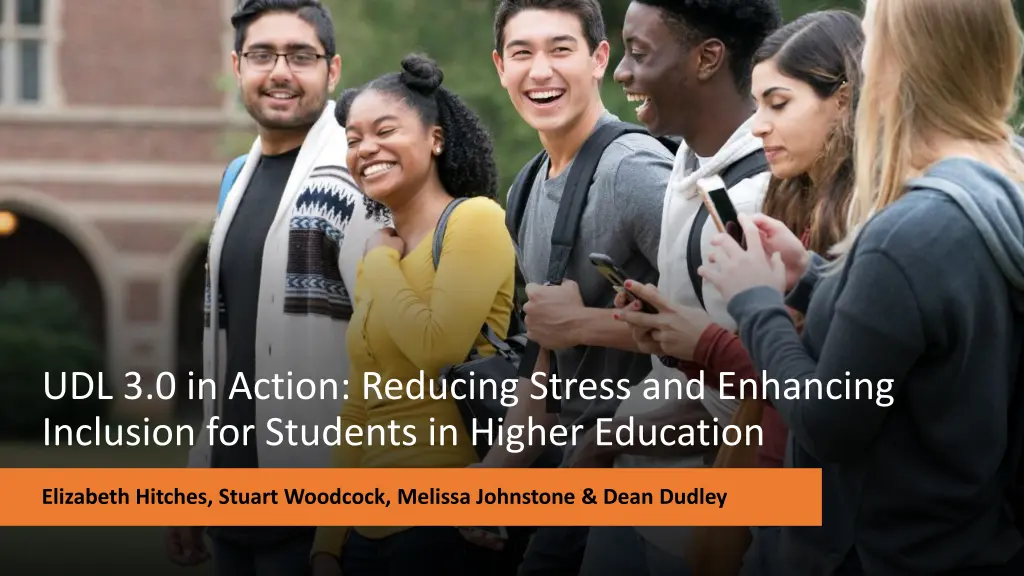
Reducing Stress for Higher Education Students
Explore the impact of academic stress on students in higher education and strategies to reduce stress levels. Learn about the challenges students face, effects of high stress, and emerging research on stress among students with disabilities. Gain insights on managing stress for better academic outcomes.
Download Presentation

Please find below an Image/Link to download the presentation.
The content on the website is provided AS IS for your information and personal use only. It may not be sold, licensed, or shared on other websites without obtaining consent from the author. If you encounter any issues during the download, it is possible that the publisher has removed the file from their server.
You are allowed to download the files provided on this website for personal or commercial use, subject to the condition that they are used lawfully. All files are the property of their respective owners.
The content on the website is provided AS IS for your information and personal use only. It may not be sold, licensed, or shared on other websites without obtaining consent from the author.
E N D
Presentation Transcript
UDL 3.0 in Action: Reducing Stress and Enhancing Inclusion for Students in Higher Education Elizabeth Hitches, Stuart Woodcock, Melissa Johnstone & Dean Dudley
Acknowledgement of Country I acknowledge the Traditional Custodians of the lands on which we join from today and recognise their valuable contributions to Australian and global society. I pay my respects to their Elders, Ancestors and their descendants, who continue cultural and spiritual connections to Country. I acknowledge Aboriginal and Torres Strait Islander people participating in this event.
Whats the challenge? Knowledge seeking What next? Outline
Students academic stress Students academic stress Stress experience in relation to academic studies (learning, achievement, navigating university life, managing study alongside other commitments)
Whats the challenge?
Effects of high stress high academic For higher education students, on its own, high academic stress can impact: Physical health Mental health Quality of life Learning capacity Academic achievement (see Pascoe et al., 2020; Ribeiro et al., 2018)
Context Pre- COVID-19 pandemic 84% of students reported high stress compared to 29% of the general population (Stallman, 2010) Since the onset of the pandemic Increased stress (von Keyserlingk et al., 2022) Decreased ability to cope (headspace, 2021)
Emerging research Students with accessibility requirements or disability may experience higher stress than their peers No statistically significant difference in stress between those who have and have not sought support from student support services (Ardell et al., 2016; Hitches et al., 2023; 2025 forthcoming) Overall, we know very little about the experiences of students who aren t registered with student support services
Knowledge seeking
Current doctoral research Phase 1 Phase 2 Stage 1 Information Gathering: Understanding students academic stress and how we might reduce this in an accessible and inclusive way Goal: Viewing stress through UDL lens Stage 2 A systematic literature review of stress reduction interventions for students with ARD in Higher Education internationally Designing: Co-designing an accessible and inclusive, stress prevention/reduction intervention Goal: Planning to prevent/reduce high stress through a UDL lens Findings: a UDL approach is lacking! ARD = accessibility requirements and/or disability
Students voices through the lens of UDL Multiple means of engagement UDL What is contributing to academic stress? Multiple means of representation Themes Multiple means of action and expression
there was not any feedback on my assessment, just a mark. I emailed the subject coordinator and the response I got was that if I wanted a remark (which I didn t, I just wanted to know how I could improve for part 2) then this could reduce my mark. These things may seem small, but when combined they feel huge (Engagement: Action-oriented feedback is absent or inconsistent) Assessment Assessment with barriers to engagement engagement Wasted our time on the meaningless/ repetitive assessments (Engagement: The relevance, value, and authenticity of assessment is not optimised)
Assessment details are unclear and ambiguous requiring reading between lines or winging it and then teachers are surprised when neurodivergent students fail or perform badly repeatedly and as a collective Assessment Assessment with barriers to representation representation (Representation: Assessment instructions that are difficult to comprehend)
Having exams, being approved for use of computer[s] yet being made to write and hurt self or overwhelm student. No use of expected extra time. Assessment Assessment with barriers to action and expression and expression (Action and expression: Lacking access to accessible assessment, including assistive technologies and tools) action all the assignments are writing essays which I think is terrible (Action and expression: Limited modes of assessment or modes that do not account for variability)
Assessment-related stressors through a UDL lens Engagement Representation Action and expression Action-oriented feedback is absent or inconsistent Assessment instructions that are difficult to comprehend* Lacking access to accessible assessment, including materials and assistive technologies and tools The relevance, value, and authenticity of assessment is not optimised Limited modes of assessment or modes that do not account for variability*
Being a mature aged student, I feel quite isolated and don't fit in or belong due to my age. When it comes to group assessments, I am very worried about not finding a group to join Participation Participation and barriers to engagement engagement (Engagement: Lacking belonging and connection)
I find it hard to focusreading 30+ pages is frustrating as a lot of them readings do not have a defined point(s) and no conclusion to the questions or issues it arises. my attention span is taking a toll. (Representation: Difficulties focusing on information dominated by one media (i.e. text) and when it is not optimised for perception and building knowledge) Participation Participation and barriers to representation representation The lack of accessible course content has been an ongoing issue for me, white backgrounds on everything and no closed captions on lectures with poor sound quality meant I could not access course content (Representation: Information presented in accessible ways)
Not being offered online tutorialsOnline tutorials worked better for me with my disabilities and I got much better grades without going into campus and getting sick as much. More time for hospital appointments where I could watch the tutorial whilst getting treatment, whereas on campus, the distance, parking, walking to class, dealing with the social stress and actively participating with stresses of other students attending unwell are too overwhelming. Participation Participation and barriers to action and expression and expression action (Action and expression: Mode of attending/ participating does not align with student needs) Desks/Tables constantly changing/layout change every week = very stressful for an Autistic person!! (Action and expression: Physical spaces lacking accessibility)
Participation-related stressors through a UDL lens Engagement Representation Action and expression Lacking belonging and connection Difficulties focusing on information dominated by one media (i.e. text) and when it is not optimised for perception and building knowledge Information presented in accessible ways Mode of attending/participating does not align with student needs Physical spaces lacking accessibility
Impacts of academic stress Health: Due to academic stress I have had headaches, stomach ulcer/gastritis, poor sleep, depression, anxiety, panic attacks. Also then when health is impacted, wellbeing declines. I become anxious and depressed. Small things feel bigger, I am teary and short fused. I isolate myself from my friends and family in order to concentrate more time on my studies. This can cause the academic stress to worsen as you have no other outlets or positive influences. Motivation: it can go both ways, either [stress] motivates me to do better or i sometimes just give up Depth of learning: [stress] makes me focus on getting assessment tasks done on time instead of really learning and exploring the content Achievement: I just shut down if it gets too much. This has resulted in two failing grades and my WAM has suffered because of it.
What can we each take away? There are many stressors which are contributing to students stress in higher education, with significant health and learning impacts Some stressors could be reduced by UDL informed actions.
Current stage of doctoral research Phase 1 Phase 2 Stage 1 Stage 2 A systematic literature review of stress reduction interventions for students with ARD in Higher Education internationally Information Gathering: Designing: Understanding students academic stress and how we might reduce this in an accessible and inclusive way Co-designing an appropriate, accessible, and inclusive, stress prevention/reduction intervention Goal: Planning to prevent/reduce high stress through a UDL lens Goal: Viewing stress through UDL lens Findings: a UDL approach is lacking!
Interested in being a part of it? Staff working in accessibility or wellbeing are warmly invited to: Share insights by participating in the co-design phase Share the flyer Hear updates on the findings
Elizabeth Hitches (she/her) Elizabeth Hitches (she/her) Email: e.hitches@uq.edu.au LinkedIn: www.linkedin.com/in/elizabeth- hitches

